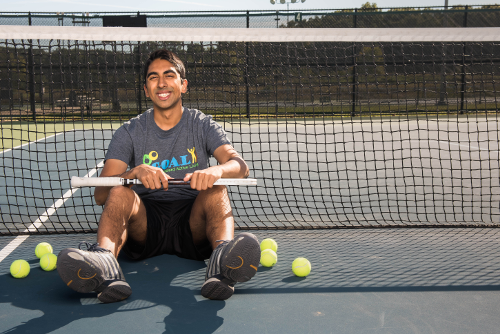Purdue student sets G.O.A.L. to improve community health
October 19, 2016

Photo by: Charles Jischke
Aspiring physician and researcher Shovik Bandyopadhyay has learned countless lessons working in laboratories with cancer researchers, but will tell you one of his most powerful came not from a scientist, but an 8-year-old boy.
“It really affected me,” explained the Purdue University senior, who is a member of the Honors College and studies biomedical science in the College of Science. “You’re aware, but this was something much more visceral.”
The young boy told Bandyopadhyay he wanted to make healthy choices, but fruit was too expensive for his family. The child was participating in the “Get Onboard Active Living” or G.O.A.L. program, an obesity prevention and awareness program through IU Health, which Bandyopadhyay brought to the Greater Lafayette area.
He recalls the moment as eye-opening and motivating, a reminder that there are economic barriers to health right here in Indiana. While Bandyopadhyay has traveled overseas on a medical brigade to serve in Quito, Ecuador; his immediate focus is community health.
“With so many pressing needs abroad, it can be very easy to forget there is a lot we can do in our own backyards,” he said.
Bandyopadhyay says obesity became an area of particular interest because he saw the impact first-hand.
“I grew up in West Virginia, lived there for 12 years, then I moved to Missouri and now I live in Indiana—all three of those states have obesity percentages greater than 30 percent,” he said. “So, it’s something I’ve been around for a very long time.”
Indiana has the 15th highest adult obesity rate in the nation, according to The State of Obesity: Better Policies for a Healthier America report released in September from the Robert Wood Johnson Foundation. West Virginia ranks second for adult obesity and Missouri 10th.
Bandyopadhyay saw the G.O.A.L. program was making a real difference in the Bloomington area and arranged for its implementation around Purdue. Together with 12 other college student volunteers, he ran after-school lessons at two local Boys and Girls Club sites. The classes focused on making healthier choices and living a more active lifestyle.
“We make it fun, it’s not like a college course where you’re just lecturing,” he explained. “Every class starts with sharks and minnows and we’re chasing after the kids. It’s a really fun time, but also exciting to see the progress made at the end of the program.”
G.O.A.L. gave student participants a written test about their health knowledge before and after the program. Results from the two sites show the students improved their knowledge between 25 and 40 percent by participating.
“Our club members liked the program so much that we will be offering year two this fall,” Christine Fader, program director for the Lyn Treece Boys and Girls Club said. “Anytime you can pass valuable knowledge to young people, you are sure to have a positive outcome. Some of our members come from awful circumstances and just need that extra push in the right direction.”
This year, the regional G.O.A.L. program will expand to reach 60-70 new children with 12 new volunteers. It will also return with new information and activities for participating children.
“I would really like to see this continue to grow,” Bandyopadhyay said. “Something like this could be incorporated not just into these after-school programs, which have a limited sample of students, but maybe into the schools themselves.”
While he knows school health classes may be sharing a similar curriculum already, Bandyopadhyay says there’s something especially effective about using college students as messengers.
“We’re sort of in this bubble of being kids and adults,” he added. “The kids in the program see us almost as older brothers and sisters. They really listen to us.”
G.O.A.L. sessions for fall will begin October 25 and will continue every Tuesday through the end of November at the Lafayette Boys and Girls Club’s 10th Street Location. Bandyopadhyay will again be highly involved, balancing G.O.A.L. programing with his extensive work in a Purdue biomedical engineering lab, where he is researching ways to better image leukemia growth. After graduation, he plans to retain his community focus while pursuing an M.D., Ph.D. with the hope of discovering new and better treatments for blood cancers. Earlier this month, he received an Abstract Achievement Award from the American Society of Hematology conference.
"I’m very interested in science and I’m very interested in research, but I can’t and don’t want to separate that from the human aspect of medicine," he said.
Writer/media contact: Lindsay Perrault (765) 427-1923.
